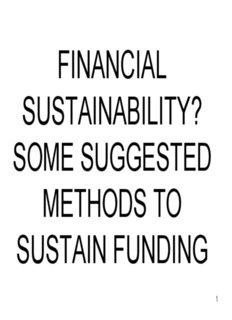
Part 9: Financial sustainability, IFFIm, AMC - Andrew Farlow PDF
Preview Part 9: Financial sustainability, IFFIm, AMC - Andrew Farlow
FINANCIAL SUSTAINABILITY? SOME SUGGESTED METHODS TO SUSTAIN FUNDING 1 One recent slide… “ • Many GAVI countries are highly dependent on external funds for immunization • Adding new vaccines and expanding coverage drive total immunization costs higher • Immunization funding is very vulnerable if/when GAVI resources end • ...but of course we're not going to let them fail, and so here are the innovative financing instruments… ” 2 Vaccine Funding 2005-15 18.0 €. d do eteeri New Vaccines gp arr. Existing ty e0 Vaccines v1 e hier cv ao o s 8.5 tm da er rg uio qpr e 3.4 re s n 2.7 nci oc 1.4 Billiva 0.9 UK Germany Poland Mexico Thailand GAVI GAVI New New Vaccines Vaccines Conj. Men ACWY, Men B, HPV, MMRV + Hib. MenC, + Rota + Rota, TB + TB + Rota, TB, Men AC, HPV, Rota Dengue, Rota, TB, Malaria Malaria, Strep in UK in Germany in Poland in Mexico in Thailand A prospective analysis in UK, Germany, Poland, Mexico, Thailand - Smart Pharma Consulting 3 GAVI financial sustainability • “Although self-sufficiency is the ultimate goal, in the nearer term, sustainable financing is the ability of a country to mobilize and efficiently use domestic and supplementary external resources on a reliable basis to achieve target levels of immunization performance.” 4 GAVI Phase 2 • If current donors continue rates of commitments and IFFIm launches as planned, GAVI will raise about $6 billion from now until 2015 • With current policies supported by GAVI including new support to systems and new applications for current vaccines, GAVI is projected to spend about $4 billion until 2015 • $2 billion remains for new vaccines 5 The gap • $2 billion available for new vaccines • GAVI Executive Committee signaled its intention to finance new vaccines • WHO GIVS estimates $3.7 billion is needed for new vaccine introduction • GAVI faces a gap of at least $1.7 billion even with current IFFIm and regular donor commitments • Bridging this gap will require new sources of financing 6 Overview, GAVI phase 2 finance ‘Innovative’ Financing Mechanisms – Global Alliance for Vaccines & Immunization • The Vaccine Fund • Advanced Development & Introduction Plans • International Finance Facility for Immunization – Other Funding Mechanisms • PAHO Revolving Fund • Vaccine Independence Initiative • ARIVAS (Appui au Renforcement de l’independence Vaccinal en Afrique Sub-Saharien ) – ‘Advance Market Commitments’ GAVI, IFF-Im, and AMCs represent $5-10B worth of financing for immunization systems and new vaccines between 2006-2010 7 1. What is the IFFIm? • An IFF for immunization (IFFIm) has been proposed as a pilot for the IFF mechanism – The IFF has been conceived as a large-scale US $50 billion per year mechanism to double global aid and help meet the MDGs – On September 9th 2006 the IFFIm was launched in London with the five donors - UK, France, Italy, Spain, and Sweden: now Norway and Brazil have announced contribution as well; South Africa is considering a contribution – Estimated disbursable of $3.2 billion before 2015 – Ongoing effort to secure resources from additional donors to reach $4 billion resource goal • First bond issuance took place late 2006 8 International Finance Facility for Immunization • IFFIm will raise additional funds for GAVI programs – Pilot of the UK-sponsored International Finance Facility to frontload immunization financing over 10 years – $4 billion borrowed from the capital markets in the form of bonds $700 Over 2005-15, 5.3 million under 5 $600 deaths and an additional 5 million New and under-used ) adult deaths could be prevented s vaccines: $1.9 b n $500 o i ll Systems support for i m $400 new vaccine ( introduction: $290m $ S U $300 Mortality reduction campaigns: $515m $200 Funds for services strengthening: $1.1b $100 Polio stockpile: $175m 5 6 7 8 9 0 1 2 3 4 5 0 0 0 0 0 1 1 1 1 1 1 9 0 0 0 0 0 0 0 0 0 0 0 2 2 2 2 2 2 2 2 2 2 2 Components of the IFFIm • Donors enter into 20 year legally binding commitments • These commitments are leveraged in the bond market • Proceeds distributed to countries and for supply procurement • Resources nominally split 50/50 systems and vaccines 10
Description: